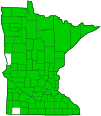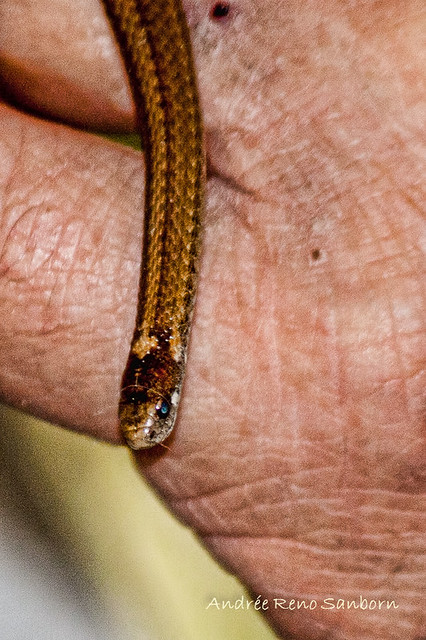Red-bellied Snake
(Storeria occipitomaculata)
Conservation • Description • Habitat • Biology • Distribution • Taxonomy
Conservation Status |
|
|||||||
| IUCN Red List | LC - Least Concern |
|||||||
| NatureServe | N5 - Secure S5 - Secure |
|||||||
| Minnesota | not listed |
|||||||
Description |
||
Red-bellied snake is a small, nonvenomous, snake, the smallest snake found in Minnesota. Adults can be 7″ to 16″ in length at maturity, though in the Upper Midwest they are described as being no more than 10″ long. Seen from above, these snakes are highly variable in appearance. They can be chestnut brown, olive-brown, tannish-brown, grayish-brown, gray, or black, but they fall generally into two color “phases”. The brown phase is brown to reddish brown or tan above (dorsally) with a broad pale mid-dorsal stripe bordered with narrow darker stripes. The gray phase has a medium gray background; a broad, light or medium gray mid-dorsal stripe bordered by narrow darker stripes; and a similar dark stripe on each side above the belly scales. Rarely, an individual will be mostly black. The belly is usually bright red. It is sometimes orange, salmon-colored, or pink, but it is always unmarked. The northern Red-bellied Snake has three pale spots at the nape of the neck, one above and one on each side. The Black Hills Red-bellied Snake has small faint spots or no spots at all. The head is usually darker than the rest of the body above and white below with a white neck. The upper (dorsal) and lateral scales have a narrow, pale, raised ridge (keel) along the centerline. There are 15 rows of dorsal and lateral scales on the midbody. The anal plate is divided. |
||
Size |
||
7″ to 10″ |
||
Similar Species |
||
Texas brown snake (Storeria dekayi texana) can be up to 18″ long. The middorsal stripe is bordered with a row of black spots. The belly is cream-colored or pinkish-white. |
||
Habitat |
||
Moist woodlands and areas adjacent to moist woodlands, lumber piles, trash dumps. |
||
Biology |
||
Behavior |
||
Individuals hide from predators under logs, rocks, and leaf litter. |
||
Lifespan |
||
Up to 4 years in captivity |
||
Life Cycle |
||
Adults usually mate in the spring or early summer. The female gives live birth to usually 7 or 8 but up to 23 live young. The offspring become sexually mature in their second year. In the winter they congregate with other snakes, often with other species of snakes, below the frost line in ant hills, animal burrows, and building foundations. They spend the winter in a reduced metabolic state (brumation), similar to hibernation in mammals. |
||
Food |
||
Mostly slugs, earthworms, and snails, but also insect larvae and pill bugs |
||
Distribution |
||||
|
Sources |
|||
| 1/7/2023 | ||||
Occurrence |
||||
Common |
||||
Taxonomy |
|||
| Class | Reptilia (Reptiles) | ||
| Superorder | Lepidosauria | ||
| Order | Squamata (Snakes and Lizards) | ||
| Suborder | Serpentes (Snakes) | ||
| Infraorder | Alethinophidia | ||
| Superfamily | Colubroidea | ||
Family |
Colubridae (Harmless Egg-laying Snakes) | ||
Subfamily |
Natricinae | ||
Genus |
Storeria (American brown snakes) | ||
Subordinate Taxa |
|||
Black Hills Red-bellied Snake (Storeria occipitomaculata pahasapae) Florida Red-bellied Snake (Storeria occipitomaculata obscura) northern Red-bellied Snake (Storeria occipitomaculata occipitomaculata) |
|||
Synonyms |
|||
Coluber occipitomaculatus |
|||
Common Names |
|||
Red-bellied Snake Red-bellied Snake |
|||
Glossary
Anal plate
In snakes: the large scale in front of and covering the anus. In turtles: one of the posterior plates of the lower shell (plastron). In Lepidoptera: the often hardened shield on the dorsal surface of the last (10th) segment of the abdomen.
Brumation
Winter dormancy in reptiles. A cold-induced period of sluggishness, inactivity, and torpor in reptiles, akin to hibernation in mammals, but they stir occasionally to drink water.
Visitor Photos |
|||||
Share your photo of this reptile. |
|||||
| This button not working for you? Simply email us at info@MinnesotaSeasons.com. Attach one or more photos and, if you like, a caption. |
|||||
Dan W. Andree |
|||||
Red-bellied snake... I seen it near Sandpiper Prairie SNA rural Norman County Mn. 9-26-21. Nice little snake it didn’t even try crawl off my hand or try get away. Just sat there until I put down on the ground then I coaxed it off the road back into the grass. |
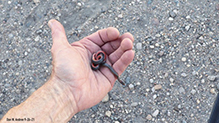 |
||||
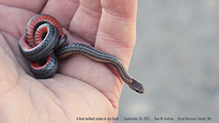 |
|||||
Red-bellied snake... Cute little snake. Sometimes snakes will emit an unpleasant odor if threatened by a predator or even human but this little red-belly didn’t and also didn’t seem to mind letting me photograph it. I like this little snake. |
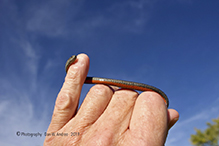 |
||||
Lisa Boschee Wiersma |
|||||
small visitor to headquarters |
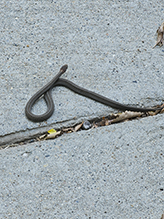 |
||||
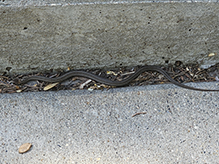 |
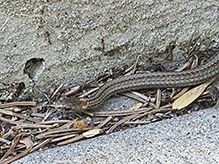 |
||||
Lane Keller |
|||||
Found this at the beginning of the trailhead. They’re often found in forest floors and the tall grasses of the reserve. |
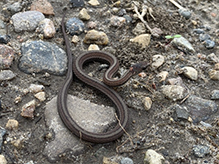 |
||||
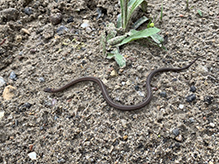 |
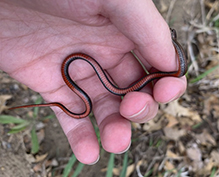 |
||||
Nelson |
|||||
under a tote on patio |
|||||
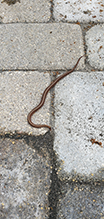 |
|||||
Sue Wahl |
|||||
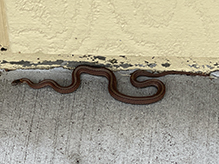 |
|||||
Rick Schneider |
|||||
Red belly snake I met this little guy this afternoon on the trail just west of Rice Lake behind 3593 Turner Drive SW in Prior Lake. It was quite docile. I saw it had the distinctive red belly so I believe it is a red belly snake. |
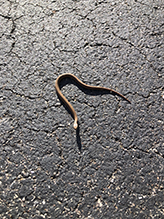 |
||||
Natalie Welle |
|||||
such a sweetie |
|||||
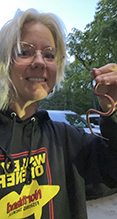 |
|||||
RANCHOKOMO |
|||||
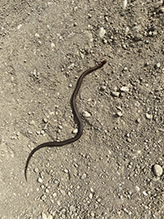 |
|||||
James Folden |
|||||
found on Sakatah bike trail |
|||||
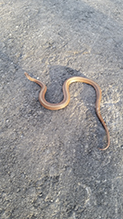 |
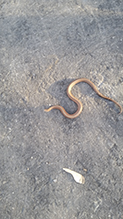 |
||||
Mark Oeltjenbruns |
|||||
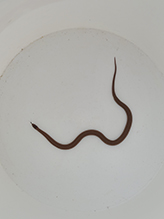 |
|||||
Amber Paniaqua |
|||||
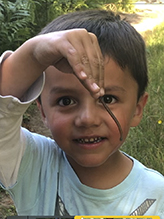 |
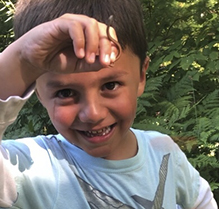 |
||||
Katie Goulet |
|||||
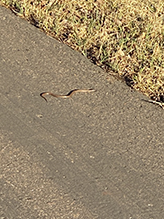 |
|||||
Mike D |
|||||
Located along Hwy 210 by Rice lake in Brainerd, MN |
|||||
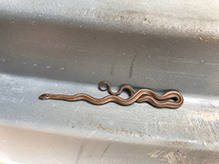 |
|||||
Bill Reynolds |
|||||
While mowing today, I just happened to notice movement in the grass. I immediately recognized the snake as the Northern Red-bellied Snake. As a child, I would catch tons of these in south central St. Louis MN. So, after turning off the mower, it took me a few moments to catch the little guy. After all, I didn't want to injure him. I took a number of photos displaying it's head, belly and back. This little guy was just a tad longer than 5.6 inches long. |
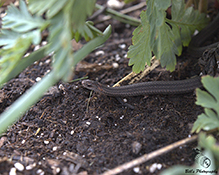 |
||||
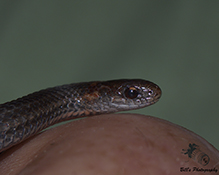 |
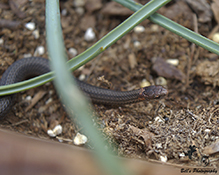 |
||||
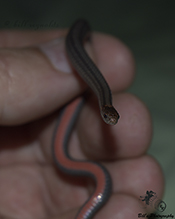 |
|||||
MinnesotaSeasons.com Photos |
|||||
|
|||||

Visitor Videos |
|||
Share your video of this reptile. |
|||
| This button not working for you? Simply email us at info@MinnesotaSeasons.com. Attach a video, a YouTube link, or a cloud storage link. |
|||
Dan W. Andree |
|||
| "Red bellied Snake" filmed by Dan W Andree Jan 4, 2024 |
|||
About
A brief narrated video about the little Red-bellied snake. Hope you enjoy it. |
|||
Natalie Welle |
|||
| Red-bellied Snake 01 May 23, 2021 |
|||
About
such a sweetie |
|||
Katie Goulet |
|||
| Red-bellied Snake 02 May 3, 2020 |
|||
About
Red-bellied Snake (Storeria occipitomaculata) Hibbing MN, 4/30/2020 Video by Katie Goulet http://www.minnesotaseasons.com/Reptiles/redbelly_snake.html |
|||
Other Videos |
|||
| Northern Red Bellied Snake Nature Walks with Mark Fraser nwwmark |
|||
About
Uploaded on May 1, 2010 The "Northern" Red Bellied Snake is a beautiful subspecies of the Red Belly and are truly incredible snakes. They have become perfectly adapted to life in the north country and make their living in the forests and meadows looking for their prey. They feed on Snails,slugs and worms and are a tiny species easily recognizable by their beautiful red underbelly. They don't usually get more then a couple feet in length. This species hibernates to survive the harsh northern winter conditions and then returns in the spring. They are a gentle snake and do not bite and are not harmful. They themselves are actually prey to many other species like birds and mammals however their population numbers are fine and they are doing very well in their northern habitats. This is a species thats a real benefit to your garden since they feed on slugs that could otherwise potentially eat the green foliage. They are a beautiful snake and a real treat to get to know please look out for these little guys and when you see them please be careful they are very sensitive species being so very small. I'm Mark Fraser and thank you so very much for watching! If you would like to check out more exciting adventures exploring the amazing wildlife all around us please visit my website http://www.naturewalkswithmark.org |
|||
| Northern Red-bellied Snake (Colubridae: Storeria occipitomaculata) Carl Barrentine |
|||
About
Uploaded on Sep 6, 2009 Photographed at the Rydell NWR, Minnesota (06 September 2009). |
|||
| Northern Red-bellied Snake (Colubridae: Storeria occipitomaculata) Carl Barrentine |
|||
About
Uploaded on Sep 6, 2009 Photographed at the Rydell NWR, Minnesota (06 September 2009). |
|||
| Northern Red-bellied Snake TheSnakeLibrary |
|||
About
Published on May 27, 2012 Northern Red-bellied Snake Description: The redbellied snake is a small woodland snake, ranging from 4 - 10 in (10 - 25 cm) long. This species is one of our most variably-colored snakes, with some individuals ranging from bright orange to brown, gray, or nearly black. Occasionally individuals are found that are gray with a brown or orange stripe down the center of the back. Many individuals have a light brown ring behind the head. This species can easily be distinguished from all other small woodland snakes by their unmarked bright orange to red underside. Range and Habitat: Redbellied snakes are found throughout the eastern US, but are absent from peninsular Florida. This species can be found in a variety of woodland habitats but in the Coastal Plain is most common in or around the margins of small wetlands. In the Mountains they are often found in open habitats such as fields and mountain balds. Although the closely-related brown snake (Storeria dekayi) adapts well to suburban habitats, this species is usually most commonly associated with forested habitats in our region. Habits: Redbellied snakes are generally very secretive and can be found hiding under logs, rocks, and leaf piles. They feed nearly exclusively on slugs. Redbellied snakes breed in the spring or fall and females give birth to 4 -- 9 (but up to 23) young, in summer. They probably reach sexual maturity within 3 years. Research at the Savannah River Ecology Lab has shown that this species tracks the changing boundaries of wetlands as they fill and dry, probably following areas where the most slugs are found. When threatened this species rarely bites but adopts a bizarre lip-curling behavior. Conservation Status: Redbellied snakes are common in some areas but uncommon to rare in others. They are not protected in our region. |
|||

Visitor Sightings |
|||||
Report a sighting of this reptile. |
|||||
| This button not working for you? Simply email us at info@MinnesotaSeasons.com. Be sure to include a location. |
|||||
| Lisa Boschee Wiersma 8/10/2023 |
Location: Rydell National Wildlife Refuge (Polk County) small visitor to headquarters |
||||
| Nelson 7/31/2022 |
Location: Pennington County, MN under a tote on patio |
||||
| Anne LeClaire 7/15/2022 |
Location: Silver Lake, McLeod County about 7" |
||||
| Lane Keller 5/12/2022 |
Location: Crow-Hassan Park Reserve Found this at the beginning of the trailhead. They’re often found in forest floors and the tall grasses of the reserve. |
||||
| Sue Wahl 5/9/2022 |
Location: St. Cloud, Stearns County Tucked up tight on the north side of the garage in a 70° day on May 9, 2022. |
||||
| Rick Schneider 10/10/2021 |
Location: Prior Lake, MN I met this little guy this afternoon on the trail just west of Rice Lake behind 3593 Turner Drive SW in Prior Lake. It was quite docile. I saw it had the distinctive red belly so I believe it is a red belly snake. |
||||
| Dan W. Andree 9/26/2021 |
Location: rural Norman County Mn. I seen it near Sandpiper Prairie SNA rural Norman County Mn. 9-26-21. Nice little snake it didn’t even try crawl off my hand or try get away. Just sat there until I put down on the ground then I coaxed it off the road back into the grass. |
||||
| Natalie Welle 5/21/2021 |
Location: Leech Lake Band of Ojibwa Chippewa Forrest such a sweetie |
||||
| RANCHOKOMO 4/17/2021 |
Location: Buffalo MN |
||||
| James Folden 11/4/2020 |
Location: SW corner Waseca County on the Sakatah bike trail found on Sakatah bike trail |
||||
| Mark Oeltjenbruns 9/13/2020 |
Location: Claremont MN |
||||
| Jett Wolters 8/202020 |
Location: near Judson, MN we have this snake in a cage if you want to see it, we plan to let it go, we were trying to figure out what kind of snake it is. Is it legal for us to keep it or must we let it go? |
||||
John Valo updated 1/7/2023 |
Legal? Not any more. A good idea? Definitely not. Here is what the Minnesota DNR has to say. Keeping a wild snake as a petAll snakes are considered protected wild animals in Minnesota. and Lizards, Snakes, and SalamandersIMPORTANT LEGAL CHANGE: Snakes, lizards, and salamanders were added to the list of protected wild animals in 2017 (MINN. STAT. 97A (link is external)). A person may not collect and/or sell wild collected Minnesota snakes, lizards, and/or salamanders unless otherwise permitted under the Fish and Game laws. |
||||
| Amber Paniaqua 8/5/2020 |
Location: Biskey Trail ( north of Duluth, near Fish Lake) |
||||
| Katie Goulet 4/30/2020 |
Location: Hibbing, MN |
||||
| Dan W. Andree 9/15/2019 |
Location: Sandpiper Prairie SNA, rural Norman Co. MN Cute little snake. Sometimes snakes will emit an unpleasant odor if threatened by a predator or even human but this little red-belly didn’t and also didn’t seem to mind letting me photograph it. I like this little snake. |
||||
| Mike D 8/15/2017 |
Location: Brainerd, MN Located along Hwy 210 by Rice lake in Brainerd, MN |
||||
| Bill Reynolds 6/9/2017 |
Location: Pennington Co. MN While mowing today, I just happened to notice movement in the grass. I immediately recognized the snake as the Northern Red-bellied Snake. As a child, I would catch tons of these in south central St. Louis MN. So, after turning off the mower, it took me a few moments to catch the little guy. After all, I didn't want to injure him. I took a number of photos displaying it's head, belly and back. This little guy was just a tad longer than 5.6 inches long. |
||||
MinnesotaSeasons.com Sightings |
|||||

Last Updated:
